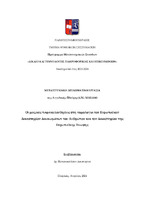| dc.contributor.advisor | Παπανικολάου, Αικατερίνα | |
| dc.contributor.author | Πλεύρη, Αγγελική | |
| dc.date.accessioned | 2024-12-19T10:15:49Z | |
| dc.date.available | 2024-12-19T10:15:49Z | |
| dc.date.issued | 2024-04 | |
| dc.identifier.uri | https://dione.lib.unipi.gr/xmlui/handle/unipi/17274 | |
| dc.identifier.uri | http://dx.doi.org/10.26267/unipi_dione/4697 | |
| dc.description.abstract | Η παρούσα μελέτη αποσκοπεί στην εξέταση της εξέλιξης της νομολογίας των δύο ανώτατων ευρωπαϊκών δικαστικών αρχών, του Ευρωπαϊκού Δικαστηρίου Ανθρωπίνων Δικαιωμάτων (ΕΔΔΑ) και του Δικαστηρίου της Ευρωπαϊκής Ένωσης (ΔΕΕ), στον τομέα των μαζικών παρακολουθήσεων. Αρχικά, παρουσιάζεται ο ορισμός των μαζικών παρακολουθήσεων και τα χαρακτηριστικά της έννοιας. Δεύτερον, στην πρώτη ενότητα αναλύονται οι διατάξεις του ΧΘΔΕΕ και της ΕΣΔΑ που κατοχυρώνουν το δικαίωμα στην ιδιωτικότητα των επικοινωνιών ως ειδική έκφραση του δικαιώματος σεβασμού της ιδιωτικής και οικογενειακής ζωής στο ενωσιακό και το διεθνές δίκαιο αντίστοιχα.
Η δεύτερη ενότητα περιλαμβάνει την ανάλυση των κριτηρίων που εισάγει η διάταξη του άρθρου 8 § 2 της ΕΣΔΑ και τα οποία πρέπει να πληρούνται προκειμένου να θεωρηθεί νόμιμος ένας τέτοιος περιορισμός του δικαιώματος στην ελεύθερη επικοινωνία, όπως ερμηνεύεται από την πλούσια νομολογία του ΕΔΔΑ Στην τρίτη ενότητα παρουσιάζονται οι αποφάσεις του ΔΕΕ για τη γενική και χωρίς διακρίσεις διατήρηση των μεταδεδομένων επικοινωνίας. Τέλος, παρέχεται μια συγκριτική επισκόπηση των αρχών που αναπτύχθηκαν στη νομολογία του ΕΔΔΑ και του ΔΕΕ και αναλύονται οι ομοιότητες και οι διαφορές στο σκεπτικό τους. | el |
| dc.format.extent | 74 | el |
| dc.language.iso | el | el |
| dc.publisher | Πανεπιστήμιο Πειραιώς | el |
| dc.rights | Αναφορά Δημιουργού-Μη Εμπορική Χρήση-Όχι Παράγωγα Έργα 3.0 Ελλάδα | * |
| dc.rights.uri | http://creativecommons.org/licenses/by-nc-nd/3.0/gr/ | * |
| dc.title | Οι μαζικές παρακολουθήσεις στη νομολογία του Ευρωπαϊκού Δικαστηρίου Δικαιωμάτων του Ανθρώπου και του Δικαστηρίου της Ευρωπαϊκής Ένωσης | el |
| dc.type | Master Thesis | el |
| dc.contributor.department | Σχολή Τεχνολογιών Πληροφορικής και Επικοινωνιών. Τμήμα Ψηφιακών Συστημάτων | el |
| dc.description.abstractEN | This study aims to examine the development of the case law of the two highest European court authorities, the European Court of Human Rights (hereinafter: ECtHR) and the Court of Justice of the European Union (hereinafter: CJEU), in the field of mass surveillance. Firstly, a definition of mass surveillance and the characteristics of the concept are presented. Secondly, the first section analyses the provisions of the CFR and the ECHR which enshrine the right to privacy of communications as a specific expression of the right to respect for private and family life in EU and international law respectively.
The second section includes the analysis of the criteria introduced by the provision of Article 8 § 2 of the ECHR which must be met in order for such a restriction on the right to free communication to be considered lawful, as interpreted by the rich case law of the ECtHR in the third section the judgments of the CJEU on the general and non-discriminatory retention of communication metadata are presented. Finally, a comparative overview of the principles developed in the case law of the ECtHR and the CJEU is provided, the similarities and differences in their reasoning are analyzed. | el |
| dc.contributor.master | Δίκαιο και Τεχνολογίες Πληροφορικής και Επικοινωνιών (MSc in Law and Information and Communication Technologies) | el |
| dc.subject.keyword | Μαζικές παρακολουθήσεις | el |
| dc.date.defense | 2024-10-29 | |



